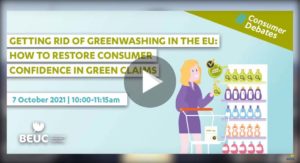Concerns about the environment and the future of our planet are increasingly growing. In the latest Eurobarometer survey, the climate crisis is listed by EU citizens as the most serious problem the world is currently facing, and this in spite of all of us being in the middle of a pandemic that you would expect to be top of people’s concerns.
More and more citizens want to help, but are puzzled how they can contribute. Faced with unreliable information to make sustainable choices and bombarded with green claims, people are often lost when it comes to identifying products, services, transport modes, heating solutions etc, that are less harmful for the environment. Instead, this task should be made much easier.
The transition is already difficult enough (with the alternatives often not being available/affordable/easy to use), without imposing additional difficulties with misleading and confusing information. Nor should not so-well intentioned businesses get a free ride to profit from this appetite for more sustainability without actually trying to protect the planet. Instead, consumers should have easy access to accurate information, which is key for them to take part in the green transformation.
Competition on the market can trigger positive changes, but only with a level playing field. Genuinely eco-friendly firms should be able to get the recognition they deserve instead of having to compete with businesses that falsely take credit for being green.
Green search filters – are they reliable?
E-commerce websites, for example, are starting to apply green search filters to help consumers choose products that are better for the environment. But are these filters reliable? Consumer organisations have already alerted their authorities that this is often not the case.[1] Information justifying why a certain product is displayed in the search results when a green filter is activated, is not always complete or relevant for that particular item. Sometimes it is not available at all.
Even flight search engines are now displaying certain flights as the “greener choice”. This kind of practice can blur the main message that consumers should be aware of – taking a flight, especially for a short distance trip, cannot be considered as the “greener choice”.
Climate neutral – do such products (or services) really exist?
Nowadays, everyone wants to call their products climate neutral, CO2 neutral or carbon neutral. We can find climate neutral bank accounts, shoes, red meat, milk, airlines, cars, bananas…literally everything. But does such a thing as “climate neutrality” even exist? No.
These claims are being justified by various compensation projects that are supposed to pay back for all the damage done to the environment when these products were manufactured and transported. The problem is that information about these projects is only rarely available, and these projects are also very rarely verified by the authorities to confirm they can make a real difference. Such claims therefore can be highly misleading and divert consumers from choosing products that are actually greener.
Who should be allowed to claim their products are green?
To help resolve these issues, green claims should only be allowed if they are verifiable. This is unfortunately not the case because current rules only allow for green claims to be verified once a complaint has been made, meaning, long after they’ve reached the market, which is often too late.
At the same time, there are not enough explicit and legally binding rules out there to frame such marketing practices. This has led to a clear rise in greenwashing. According to a recent ‘sweep’ by the network of the consumer protection authorities (CPC network), 42% of claims analysed potentially constitute an unfair commercial practice, banned by EU legislation.
To fix this once and for all, BEUC advocates for a Europe-wide pre-approval scheme for green claims, inspired by the one that already exists for health and nutrition claims in food. We also call for an EU-wide registry where all the pre-approval decisions could be published and made applicable also to any other businesses wanting to make a similar claim in the future. Specific, types of claims with no scientific basis, like “climate neutral”, must be explicitly forbidden in the legislation.
Adapting the existing EU rules on unfair practices[2] can complement our proposal on the pre-approval scheme but is, in our view, not enough to tackle greenwashing due to the scale of the phenomenon. It can however make an important first step in the fight for reliable consumer information on the environmental performance of goods and services. BEUC therefore looks forward to the upcoming legislative initiative on empowering the consumer for the green transition and hopes that it will not shy away from proposing ambitious changes.
Green transition and what consumers need
Many efforts are required from consumers to contribute to saving our planet, but those changes cannot be put entirely on their shoulders.
Policymakers and businesses have a crucial role to play to make this transition easier for consumers. They must make sure that only reliable and verified claims are used on the market to enable consumers to make truly green choices.
If we want consumers to get on board with the green transition, we must first equip them with the right tools to do it. And protect them from rampant greenwashing.
For more information about our recommendations check out our position paper or the recording of BEUCs recent #ConsumerDebates dedicated to the problem of greenwashing.
 [1] For more information see : https://taenk.dk/aktiviteter-og-kampagner/stop-greenwashing-forbrugerraadet-taenk-anmelder-5-webshops or https://www.forbrukerradet.no/siste-nytt/klesbransjen-gronnvasker-i-nettbutikkene/
[1] For more information see : https://taenk.dk/aktiviteter-og-kampagner/stop-greenwashing-forbrugerraadet-taenk-anmelder-5-webshops or https://www.forbrukerradet.no/siste-nytt/klesbransjen-gronnvasker-i-nettbutikkene/
[2] Directive 2005/29/EC of the European Parliament and of the Council of 11 May 2005 concerning unfair business-to-consumer commercial practices in the internal market

